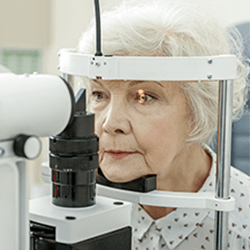Cataract Surgery near Kansas City, KS
What Is Cataract Surgery?
Considered very safe and highly beneficial, cataract surgery is one of the most commonly performed procedures worldwide. Cataract surgery is performed to improve vision when a cataract is affecting your eyes. A cataract is like a cloudy film that forms over the natural lens inside your eye, making it difficult to see clearly.
During the surgery, the cloudy lens is removed, and a clear artificial lens is put in its place. This new lens helps to restore your vision, making things appear clearer and more focused. It’s a common and safe procedure that can greatly improve your ability to see and enjoy daily activities.
If you have trouble seeing due to cataracts, our team and experienced eye surgeons at Heart of America Eye Care can help. After thorough examinations and reviewing your overall health and vision goals, we’ll help you determine which treatment is best for you. To find out more, schedule a visit to one of our locations in Shawnee Mission, Overland Park or Belton. We’re here to provide you with the information you need.
What Are the Benefits of Cataract Surgery?
Cataracts can make it difficult to see and complete everyday tasks. Cataract surgery improves symptoms associated with cataracts, such as cloudy vision and halos, but also reduces dependency on glasses and contacts at the same time. Some benefits of cataract surgery include:
- Easier to drive at night
- Easier to play sports
- Quick recovery
- Better vision
Who Can Have Cataract Surgery?
For the most part, anyone in good health is likely a candidate for cataract surgery. There are certain factors, however, that can limit an individual’s eligibility for cataract surgery. Some individuals who may not qualify for cataract surgery include:
- Those who are pregnant or nursing
- Those in poor health
- Those who have a preexisting eye condition
- Individuals on certain medications
What Can I Expect From Cataract Surgery?
Our eye surgeons perform cataract surgery as an outpatient procedure at our surgery center in Prairie Village, KS, often in under 15 minutes for each eye. Here’s what you can generally expect during cataract surgery:
1. Anesthesia: Cataract surgery is typically done with local anesthesia, which numbs the eye area. You will likely be awake during the procedure, but you won’t feel any pain. Most patients will also receive mild sedation to help them relax.
2. Incision: Your surgeon will make two small incisions in the clear covering of your eye (cornea). The incisions are tiny and usually require no stitches.
3. Cataract Removal: Using specialized instruments and a microscope, the surgeon will break up the cloudy cataract and remove it from your eye.
4. Lens Replacement: Once the cataract is removed, the surgeon will insert a new artificial lens (intraocular lens or IOL) into your eye. This new lens will replace your cloudy natural lens and help you see clearly.
5. Closing the Incision: In most cases, the incisions are self-sealing and don’t require stitches. They will heal on their own.
6. Recovery: After the surgery, you’ll spend a short time in a recovery area to ensure there are no immediate complications.
7. Going Home: You’ll be able to go home on the same day of the surgery. However, you will need to arrange for someone to drive you because your vision may be temporarily blurry.
8. Post-Operative Care: Your doctor will provide you with specific instructions on how to care for your eye after surgery. It’s important to follow these instructions carefully. You may be using prescription eye drops to prevent infection and reduce inflammation.
9. Follow-Up Visits: You’ll have follow-up appointments with your eye doctor to monitor your healing and check your vision. Most people experience improved vision within a few days after surgery.
Cataract surgery is generally quick and relatively painless, and it has a high success rate in improving vision. While there may be some temporary discomfort or blurry vision during the recovery process, most people find that their vision improves significantly, allowing them to see more clearly and enjoy daily activities without the hindrance of cataracts.
What Happens After Cataract Surgery?
When the surgery is complete, you will be provided with post-surgery instructions that will help with the healing process. These rules may include things like if using eye drops is necessary, if an eye patch will have to be worn, how to sleep without putting pressure on the eyes, and taking a break from certain strenuous tasks. It is routine for patients to notice a degree of distorted vision for one or two hours after the procedure, but this is merely an adjustment process during which the rest of the eye and the vision center of the brain begin working with the new lens. Generally, individuals who undergo cataract surgery will have bloodshot scleral tissue plus some bruising that mimics a black eye for a week or so following the surgery.
We will likely have you come back in within 24 hours of your treatment for an initial follow-up exam and to set up further appointments according to your recovery timeline.
Does Insurance Cover Cataract Surgery?
Yes, cataract surgery is often covered by insurance, as it is considered a medically necessary procedure to restore vision. However, the extent of coverage may depend on your specific insurance plan and whether additional options, such as premium intraocular lenses or laser-assisted surgery, are chosen. It’s always a good idea to review your insurance benefits and discuss any potential out-of-pocket costs with your provider before scheduling the procedure. At Heart of America Eye Care, our team is happy to assist you in understanding your coverage and what is included.
Cataract Surgery FAQ
Is cataract surgery painful?
Prior to your cataract surgery, we will apply a numbing solution to the eye, so you should remain relatively comfortable. Your eyes may feel a bit numb for several hours after your procedure, after which you may experience some discomfort.
How long does it take for vision to stabilize after cataract surgery?
Recovery varies from patient to patient; however, for most of our patients, eyesight stabilizes about 1 – 3 months after their cataract surgery. We will schedule follow-up appointments to ensure you are healing properly.
Should I avoid anything after cataract surgery?
There are a few things you should avoid after cataract surgery. Those include:
- Avoid getting shampoo in your eyes
- Hold of on exercise or strenuous housework until cleared to do so
- Don’t wear make up for about a month
- Don’t drive until given the all-clear to do so
Say Goodbye to Cataracts
Our mission at Heart of America Eye Care is to safeguard your vision and overall eye health. Our dedicated team of eye care professionals possesses the expertise to provide you with the precise eye care you need. If you’re dealing with cataracts, don’t hesitate to reach out to us at one of our convenient locations in Shawnee Mission, Overland Park, or Belton. Schedule an eye exam to determine if cataract surgery is the right option for you. Your vision is our priority.
* All information subject to change. Images may contain models. Individual results are not guaranteed and may vary.

